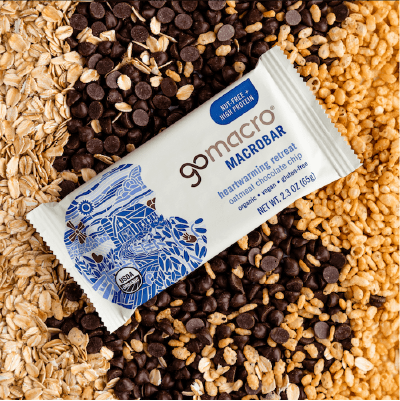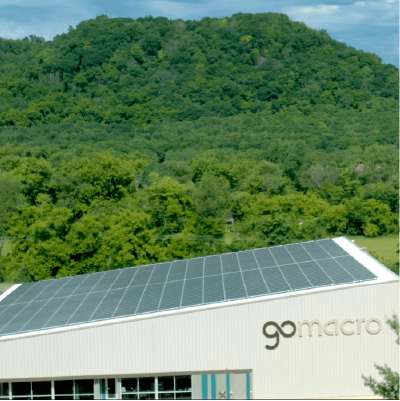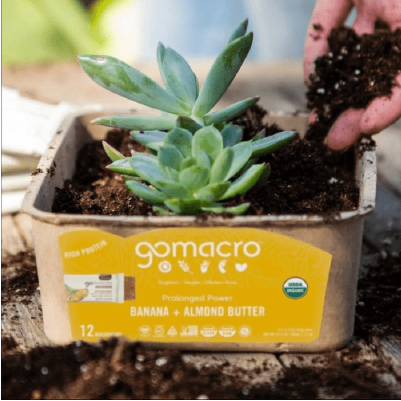Founders and advocates for a balanced, plant-based lifestyle.
In 2003, Amelia Kirchoff was diagnosed with breast cancer. After speaking with her daughter, Jola, Amelia decided to fight the cancer with a plant-based macrobiotic diet in addition to a local lumpectomy. In the face of adversity, Jola and Amelia came together, fought the cancer, and Amelia won.
During her battle with cancer, Amelia created the MacroBar® recipe in her kitchen on the Wisconsin family farm. In the years following, Amelia and Jola began spreading the power of a balanced, plant-based lifestyle through GoMacro’s healthy and delicious MacroBars.
Let’s learn more about GoMacro.
 Tell us about the food philosophy behind GoMacro’s impressive set of certifications?
Tell us about the food philosophy behind GoMacro’s impressive set of certifications?
We’re committed to creating high-quality products from simple, sustainably-grown ingredients, and certifications are one way we keep that promise to everyone who purchases MacroBars. We want to set the standard for the quality and integrity of the foods we eat, as well as the standard for how companies can make a positive impact on the planet.
Most people enjoy our bars simply because they taste amazing and are made with ingredients they can trust. We also know that many of our core-consumers have a restricted diet by choice or by necessity, which can make it difficult to find foods that suit their dietary needs and taste great. Food and sustainability certifications allow all our consumers to rest assured there’s a snack they can enjoy that’s aligned with their values.
How has being set in the Driftless region influenced the business?
It’s an honor being part of such a great community of farmers, foodies, and people who care about supporting local businesses. The local culture around food and sustainability has influenced the way we’ve done business from the start. Many members of our staff are proud residents of the Driftless area who are passionate about maintaining the beauty of the region, and we all take pride in what we’ve been able to accomplish while staying true to our rural roots. We’re also continually inspired by other great businesses like Organic Valley who are also working to restore and promote sustainable business in Wisconsin and beyond.
Thanks to the state of Wisconsin, we’ve been able to get creative with our green energy initiatives. Our facility in Viola has been 100% wind and solar-powered since October 2018. In 2020, GoMacro had the opportunity to subsidize the cost of renewable energy credits for the entire Village of Viola. Now Viola is powered by 100% renewable wind energy – some of which is generated in nearby Cashton, WI – with no additional cost to residents. It’s the first known arrangement of its kind in the country, and we’re grateful that local and state leaders have helped us make such a unique program possible.
 Sustainable sourcing is one of the core principles of GoMacro. How does your team determine which ingredients are grown sustainably? Do you source any ingredients from the Driftless region?
Sustainable sourcing is one of the core principles of GoMacro. How does your team determine which ingredients are grown sustainably? Do you source any ingredients from the Driftless region?
We believe that food that is closer to the earth and less processed is healthier for the body and soul. We source 100% plant-based ingredients from Certified Organic and Non-GMO growers who follow sustainable farming practices, and we have a very rigorous process for vetting vendors.
One great example is our long-term partnership with Once Again Nut Butter. Through Once Again, we were able to take a trip to Sicily, Italy, to personally meet our almond suppliers, talk to their farmers about the organic almond growing process, meet their families, witness a harvest, and help gather newly-fallen almonds.
We currently source our gluten-free oats from nearby Viroqua, and our team is always looking for opportunities to support and expand our local sourcing program.
Do you have any ongoing goals to make GoMacro more eco- friendly/sustainable?
Sustainability has always been woven into the fabric of our business, so we’re continually looking for ways we can make a positive impact on the planet. We have an internal “Green Team” with members from multiple departments that proposes new initiatives and tracks our progress toward environmental goals.
One of those goals we’re really proud to have accomplished was powering our facility with 100% renewable energy. Our next big milestone is to achieve Zero Waste Certification. We’ve already made significant progress by sending 100% of our food waste to local farms for animal feed, and by recycling gloves, hairnets, and nut butter pails. We publish an annual sustainability report that can be found at gomacro.com/sustainability if anyone’s interested in learning more about food waste, recycling and other initiatives.
 Tell us about the history of the family farm in Viola. Is it still an operating farm?
Tell us about the history of the family farm in Viola. Is it still an operating farm?
We never intended to come to Viola to start a company, but GoMacro was a wonderful and unexpected blessing. Our family was based in Chicago, and my mother, Amelia, moved to Viola to retire and become a homesteader. She created all the original recipes for what became MacroBars in the farm kitchen, and our headquarters remains just down the road in Viola to this day!
The family farm is still very much a hobby farm with Highland Cattle, horses, llamas, and more, plus a fully functioning garden with dozens of vegetable varieties. We offer a Farm Share program to employees with fresh produce from the farm during the growing season.
Tell us about the journey from a home kitchen in a small town to national accessibility.
Our journey has been a lot of slow and steady growth and a lot of learning as we go. When we got started, we had no business experience within the natural foods or retail industries, but we took things one step at a time and made sure they were done correctly.
In the early years, when I had just moved to San Diego, my mom and I decided to take a drive up the California coast and hit every natural grocery store we could find. We came back with about 70 new orders, and most of those stores still carry MacroBars today. They were truly with us from the beginning, and we’re so grateful for their support over the years.
After that, we slowly began to acquire Whole Foods regions, one by one, along with other large, natural grocery chains. Before we knew it, we were being sought after by national retailers, many in the conventional food channel. We recently launched our Kids MacroBars in 1,600 Walmart stores, which is a testament to how delicious and healthy, plant-based options aren’t limited to just one niche of the market. We see our national growth as an opportunity to make plant-based, organic foods more accessible to all.
 How do you come up with new GoMacro recipes? Have you had any interesting, or failed experiments?
How do you come up with new GoMacro recipes? Have you had any interesting, or failed experiments?
My mom created all the original recipes in her kitchen on the farm, and we still develop all our recipes in-house. As we’ve grown, we saw the need for a formal Innovations team, and we’re always experimenting with new ideas. We’ve gained some valuable ideas over the years from our consumers and our retail partners. We also like to stay up on current trends and sometimes look for inspiration there. There are some exciting new flavors in our innovation pipeline, and we always love hearing feedback from our fans.
GoMacro guarantees their ingredients are sourced ethically. In our mainstream food culture, ethics are not usually part of the conversation. How do we impact the reconnection of food and ethics in our current food system?
We see our role in this bigger conversation as remaining committed to our farmers and independent ingredient suppliers. This helps make these high-quality ingredients more accessible to smaller operations and demonstrates to other entrepreneurs, companies, and consumers that a sustainable business model is still possible. The more that consumers seek out brands that are transparent about their sourcing and shop with companies whose values are aligned with theirs, the more demand there will be for companies to consider their sourcing practices.
 Part of GoMacro’s mission is to spread awareness for a balanced plant-based lifestyle. What are some ways you have done this in the Driftless region?
Part of GoMacro’s mission is to spread awareness for a balanced plant-based lifestyle. What are some ways you have done this in the Driftless region?
We have developed a committee to help GoMacro stay involved in the local community’s many events and activities. We also offer opportunities to our employees, including a Farm Share program with fresh produce from the family farm, as well as recipes suggestions.
We hope to eventually build out more local events centered around organic living and plant-based foods for all community members. As we keep growing, we hope we can continue inspiring individuals and companies in the region to get creative about how they can make a positive impact.
I’ve been a vegetarian for over a decade and changed to a vegan diet in 2020. At times, it can be challenging to talk to people about eating a plant-based diet in the Midwest. There are a lot of misconceptions about nutrition as well as stereotypes of being highfalutin. Have you found effective ways to bring your message to those who may be close minded about eating a plant-based diet?
We believe in a positive, compassionate approach to plant-based eating and try to lead by example through sharing plants, unprocessed foods, and vegetarian meals with our almost 200 employees.
We hope to make plant-based diets more approachable and less intimidating by offering familiar flavors and delicious snacks. At the same time, we know these things take time and hope that as we continue to promote this lifestyle, people’s eyes will slowly be opened to the benefits of plant-based foods.
We’re committed to becoming more involved in our local Driftless community by sharing our bars and helping prove that healthy and delicious are not mutually exclusive.
 Overcoming adversity is another cornerstone of the GoMacro story. What are some of the adversities you’ve had to overcome as a company?
Overcoming adversity is another cornerstone of the GoMacro story. What are some of the adversities you’ve had to overcome as a company?
As a relatively small, mother-daughter owned company, we’ve had to learn as we go – but that’s both the challenge and the gift. The natural food industry, and bars in particular, is highly competitive, and many of our competitors are heavily funded. It’s been so important to find our niche and help tell our story in a way that resonates with consumers.
Growth is such a blessing, but it does come with growing pains at times. Sourcing larger quantities of organic ingredients that fit our certifications and scaling our operations to meet the increasing demand are both challenges that we continue to work through. We’re grateful to have a team that’s committed to finding solutions that reflect our high standards as we grow.
Could you share a success story from your Giving Back program?
A portion of proceeds from several of our MacroBar flavors goes to national and international causes aligned with our values. We currently partner with Solutions for Change, Feeding San Diego, Farm Sanctuary, Sheldrick Wildlife Trust, and the Keep A Breast foundation. We’re so excited about the work these organizations are doing to improve our communities and our planet, and we’re proud to play a part in helping them accomplish their missions.
GoMacro is dedicated to a sustainable food system. What would that look like? How would we get there?
We all play a part in creating a more sustainable food system, from those growing the food to companies who purchase ingredients to consumers who initiate the demand for these foods. For GoMacro’s part, we continue to promote and participate in organic and regenerative farming economies. Education is key, as when we know better, we can all do better.
We’re committed to supporting local infrastructure and agriculture as we continue to grow in the region.
Tell us about donating MacroBars to frontline workers during Covid. Would it be possible to share photos of this for the article?
It was an honor to share over 250,000 bars with frontline workers throughout the ongoing pandemic. We believe we all have a part to play, and so many people and organizations stepped up to help those in need. We’re grateful we had the opportunity to provide delicious nourishment and fuel for our heroic healthcare workers and first responders.
Author – Aspen


